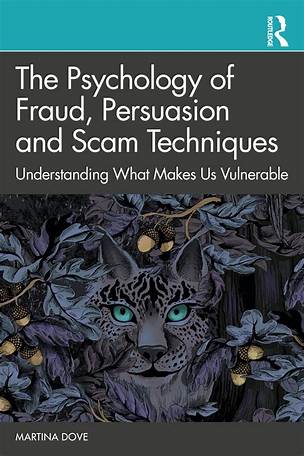
Dr Martina Dove is a researcher with a passion for fraud prevention. During her PhD, she researched individual characteristics that make people susceptible to fraud, scam and persuasion techniques used by fraudsters and human factors, such as cognitive biases and mental models, that contribute to fraud victimisation.
She recently published the book: “The Psychology of Fraud, Persuasion and Scam Techniques” and also writes for State of Security blog. We have copies of her book to give away to attendees asking the best questions.
REGISTER NOW TO TAKE PART: 3PM, 24TH FEBRUARY
What is your current role and/or your interest in tackling cybercrime?
I am a senior user experience researcher. Currently I am working for New Relic, which is a tech company producing monitoring and observability software. Previous to that, I worked at Tripwire, a cybersecurity company.
What lead you to undertake this work? Can you give us a brief career history?
I wasn’t sure what I wanted to do for my PhD and I took a lot of time figuring it out. Then I came across a research paper talking about psychology used in phishing emails and I was hooked. I didn’t know much about scams before that – people often don’t get interested until they are scammed – but I found it very interesting and decided to pursue research that concentrates on phishing emails and other scams.
In the midst of a global pandemic and with escalating geopolitics between superpowers is cybercrime receiving the attention it deserves? Or do we overstate cybersecurity risks?
The pandemic has definitely contributed to hardship for many companies out there. As a result, cybersecurity is typically a first thing many companies skimp on, especially smaller companies. On the flip side, pandemic has created a perfect opportunity for scammers to thrive. In the first days, the fear and uncertainly made people act irrationally, and many scams exploited this. People also underestimate the power of a simple but perfectly targeted phishing email. Many companies secure their systems but forget their biggest weakness – the human. And during the pandemic, people were in a heightened state of stress (and still are) and this is a perfect time to target them.
What should countries be doing to quantify and help mitigate organised cybercrime?
Organize, collaborate, put systems in place to tackle international cybercrime. What I mean by that is that a lot of cybercrime is not even prosecuted because it crosses boarders. Perpetrator is in one country but targets a company in another. Who should prosecute? And this helps cybercriminals thrive and brings their risks to a minimum if they keep if cross border. Having effective international processes in place for investigating and prosecuting cross border cybercrime would be a great start. Also, sentences should be longer, much longer. If I was a cybercriminal and felt that I could be arrested and extradited to a country anywhere in the world, and could potentially serve a long sentence, suddenly there are a lot more cons than pros to committing cybercrimes.
If you were advising friends and family on staying safe and secure online what would be your number one recommendation?
Never click links from emails, no matter how legitimate the email looks. Double check the information.
